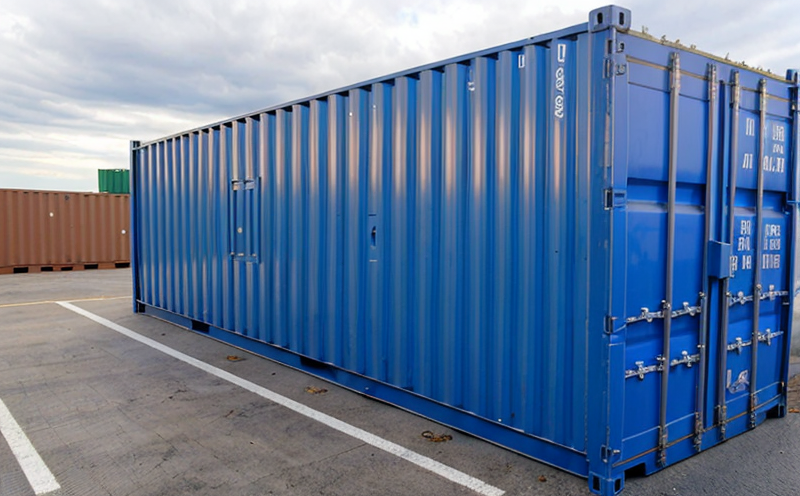ISO 75 Heat Deflection Temperature Testing of Plastic Storage Plastics
The ISO 75 standard is a widely recognized and internationally applicable test method used to determine the heat deflection temperature (HDT) of plastics. This critical parameter plays a pivotal role in ensuring that plastic storage containers meet performance requirements under thermal stress, particularly in high-temperature environments.
Heat deflection temperature refers to the temperature at which a standard specimen bends 0.1 inches when subjected to a specified load. This test is essential for validating the structural integrity and reliability of plastic storage containers used across various sectors such as pharmaceuticals, food & beverage, and industrial manufacturing. By adhering to ISO 75, laboratories ensure compliance with international standards and enhance product quality.
The testing process involves precise specimen preparation, which includes selecting appropriate dimensions for the sample based on its intended use in storage applications. The specimen is then subjected to a constant load while being heated at a controlled rate until it deflects by 0.1 inches under the specified conditions. This method provides valuable insights into how different plastics perform under thermal stress.
The significance of HDT testing lies in its ability to predict real-world performance accurately. For instance, if plastic storage containers are exposed to high temperatures during transport or storage, they must maintain their shape and integrity without deformation. Failure to meet the specified HDT can lead to potential leaks, structural failure, or compromised product quality.
It is crucial to note that not all plastics exhibit the same behavior under thermal stress. Some may deform more easily than others at higher temperatures, which underscores the importance of accurate testing and compliance with international standards like ISO 75. By adhering strictly to these guidelines, laboratories ensure reliable test results that can be trusted by clients across various industries.
The process involves several key steps:
- Selection of appropriate specimen dimensions
- Heating the specimen at a controlled rate
- Applying constant load until deflection occurs
- Careful recording and analysis of results
The outcome of this testing provides valuable data that helps manufacturers optimize their products for better performance in challenging conditions. This not only enhances product reliability but also ensures compliance with regulatory requirements, thereby building trust among consumers.
For instance, pharmaceutical companies rely on plastic storage containers to safely transport and store temperature-sensitive medications. Ensuring these containers meet the HDT standards specified by ISO 75 is crucial for maintaining product integrity throughout distribution channels.
In conclusion, ISO 75 Heat Deflection Temperature Testing is an indispensable tool in ensuring that plastic storage containers are designed and manufactured to withstand thermal stresses without compromising their structural integrity. This testing process contributes significantly to the overall quality assurance efforts within industries where reliable packaging solutions are essential.
Applied Standards
The ISO 75 Heat Deflection Temperature Testing of Plastic Storage Plastics adheres strictly to the international standard ISO 75:1984, which provides detailed specifications for conducting this type of test. This standard ensures consistency and accuracy across different laboratories worldwide.
Some key aspects covered by ISO 75 include:
- Specimen preparation
- Temperature control during testing
- Load application techniques
- Data recording protocols
By following these rigorous guidelines, laboratories can produce reliable and reproducible test results. This is particularly important given the diverse range of materials used in plastic storage containers today.
In addition to ISO 75, other relevant standards that may apply depending on specific industry requirements include:
- ASTM D1525
- EN 13934
- IEC 60695-2-107
These additional standards further reinforce the importance of adhering to best practices in plastic testing, ensuring that all parameters are accounted for and tested thoroughly.
EuroLab offers unparalleled expertise in ISO 75 Heat Deflection Temperature Testing of Plastic Storage Plastics. Our team of highly skilled professionals ensures that every test conducted meets the highest standards, providing accurate and reliable results.
We utilize state-of-the-art equipment and facilities to conduct these tests, ensuring consistent and repeatable outcomes. Our comprehensive approach includes:
- Advanced specimen preparation techniques
- Precise temperature control systems
- Robust load application mechanisms
- Detailed data analysis tools
This combination allows us to deliver precise and consistent test results, which are crucial for ensuring product quality and compliance with international standards.
We pride ourselves on providing not just accurate testing but also in-depth technical support. Our experienced staff can offer guidance on specimen preparation, interpretation of results, and recommendations for improving material performance. This holistic approach ensures that our clients receive the most valuable insights into their products' behavior under thermal stress.
Quality and Reliability Assurance
EuroLab is committed to maintaining the highest levels of quality and reliability in all our services. Our ISO 75 Heat Deflection Temperature Testing of Plastic Storage Plastics adheres strictly to international standards, ensuring that every test conducted meets the required specifications.
We have implemented rigorous quality control measures throughout the testing process, from specimen preparation to result analysis. This includes:
- Stringent validation of equipment and instrumentation
- Detailed documentation of all testing procedures
- Regular calibration checks for temperature and load parameters
- Comprehensive data review processes
By maintaining these strict protocols, we guarantee that our results are accurate, reliable, and consistent. This commitment to quality extends beyond the testing process itself; it encompasses every aspect of our operations, ensuring that clients receive the most trustworthy information possible.





